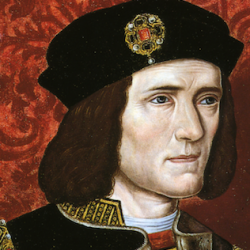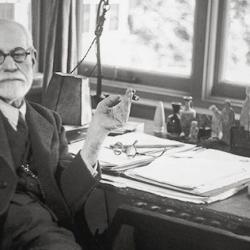When Shakespeare’s Richard II disembarks in Wales, he learns that Henry Bolingbroke has usurped his throne and that three of his most trusted allies have turned Judas—“three Judases, each one thrice worse than Judas!” (3.2.132). Villains, vipers, dogs, and snakes have become his courtiers.
The most shocking blow, though, is the blow to Richard’s confidence in his kingship. When he steps onto the shore, he touches the ground with his royal, anointed hand, and calls on mother earth to stand by him by opposing the rebels:
Dear earth, I do salute thee with my hand,
Though rebels wound thee with their horses’ hoofs:
As a long-parted mother with her child
Plays fondly with her tears and smiles in meeting,
So, weeping, smiling, greet I thee, my earth,
And do thee favours with my royal hands.
Feed not thy sovereign’s foe, my gentle earth,
Nor with thy sweets comfort his ravenous sense;
But let thy spiders, that suck up thy venom,
And heavy-gaited toads lie in their way,
Doing annoyance to the treacherous feet
Which with usurping steps do trample thee:
Yield stinging nettles to mine enemies;
And when they from thy bosom pluck a flower,
Guard it, I pray thee, with a lurking adder
Whose double tongue may with a mortal touch
Throw death upon thy sovereign’s enemies. (3.2.7-22)
Spiders, toads, nettles, and adders do the earth’s bidding, while the earth does the king’s bidding. Richard and his land form a unity because he is the Lord’s anointed:
Not all the water in the rough rude sea
Can wash the balm off from an anointed king;
The breath of worldly men cannot depose
The deputy elected by the Lord:
For every man that Bolingbroke hath press’d
To lift shrewd steel against our golden crown,
God for his Richard hath in heavenly pay
A glorious angel: then, if angels fight,
Weak men must fall, for heaven still guards the right. (3.2.54-62)
After he hears the news of Bolingbroke’s coup, however, he recognizes that the land will not stand with him any more than his Judas friends do. The earth that he hoped would produce an army of spiders and toads now becomes a script on which his tears will write his sorrow. The only land he can now claim is his grave, the “small model of the barren earth / which serves as paste and cover to our bones” (3.2.153-4).
On that rebellious earth that will be his tomb, Richard sits to “tell sad tales of the death of kings.” It is one of the most famous passages in Shakespeare’s histories, and the one that gave the title to the recent BBC series, “The Hollow Crown.”
For God’s sake, let us sit upon the ground
And tell sad stories of the death of kings;
How some have been deposed; some slain in war,
Some haunted by the ghosts they have deposed;
Some poison’d by their wives: some sleeping kill’d;
All murder’d: for within the hollow crown
That rounds the mortal temples of a king
Keeps Death his court and there the antic sits,
Scoffing his state and grinning at his pomp,
Allowing him a breath, a little scene,
To monarchize, be fear’d and kill with looks,
Infusing him with self and vain conceit,
As if this flesh which walls about our life,
Were brass impregnable, and humour’d thus
Comes at the last and with a little pin
Bores through his castle wall, and farewell king!
Cover your heads and mock not flesh and blood
With solemn reverence: throw away respect,
Tradition, form and ceremonious duty,
For you have but mistook me all this while:
I live with bread like you, feel want,
Taste grief, need friends: subjected thus,
How can you say to me, I am a king? (3.2.155-77)
By the end of the speech, Richard admits to being nothing but another bread-eater, another needy, grieving, lonely mortal. But the speech is not merely about the mortality of kings. It’s about the way crowns, traditions, forms, and ceremonious duties seduce a king into forgetting himself, into dreaming of immortality. The hollow crown is Death’s courtroom, Death the “antic,” Death the clown, who mocks the crowned king by allowing him to monarchize for a moment or two before breaking through the castle wall with a pin. Every king is “murder’d” because all are set up for a fall, all trapped by Death’s antics. Once the king is exposed as just another mortal, all the ceremonies that signify kingship seem pointless. Richard urges his remaining loyal men to renounce reverence and respect. The king himself is subjected to need, to grief, to death: “Subjected thus, / How can you say to me, I am a king?” Can, Richard asks, a mortal be a king?
In depicting Richard’s recognition of mortality, Shakespeare seems to dramatize the collapse of medieval royal ideology. Whether Shakespeare knew it or not, Richard mistakes the nature of kingship as much as he thinks his friends have mistook him. The ideology that Ernst Kantorowicz described as the theory of the “king’s two bodies” is founded on the recognition that the king is double—mortal and immoral. As Kantorowicz put it, “The King has in him two Bodies, viz., a Body natural, and a Body politic. His Body natural (if it be considered in itself) is a Body mortal, subject to all infirmities that come by Nature or Accident, to the Imbecility of Infancy or old Age, and to the like Defects that happen to the natural Bodies of other People” (7). The two bodies are united, but the whole point of the theory is to ensure stability and continuity in a world where kings die. As one Tudor lawyer put it, “The King has two Capacities, for he has two Bodies, the one whereof is a Body natural, consisting of natural Members as every other Man has, and in this he is subject to Passions and Death as other Men are; the other is a Body politic, and the Members thereof are his Subjects, and he and his Subjects together compose the Corporation. This Body is not subject to Passions as the other is, nor to Death, for as to this Body the King never dies, and his natural Death is not called in our Law the Death of the king, but the Demise of the King, not signifying by the Word Demise that the Body politic of the King is dead, but that there is a Separation of the two Bodies, and that the Body politic is transferred and conveyed over from the Body natural now dead to another Body natural” (Justice Southcote in Willion v. Berkley, quoted Kantorowicz, 13). Medieval political theology was developed to explain the double reality of the immortality and the mortality of the king.
Shakespeare appears to have understood this. Alex Schulman (Rethinking Shakespeare’s Political Philosophy) points out that “Bolingbroke revealed political reality rather than heretically altering it; second, what turns out to be most important about Richard is what he shares with others, rather than what they owe him. . . . Bolingbroke senses that ‘subjects’ constitute authority as much as authority controls subjects. This is why he and his son make good politician–monarchs, however skin-deep their populist commitments” (136-7). Schulman goes on to point out that “Abdicating, Richard first seeks not a clock but a mirror: ‘show me what a face I have / Since it is bankrupt of its majesty’. Stripped of customary authority he ‘turn[s] mine eyes upon myself’ and discovers having given ‘my soul’s consent / To’undeck the pompous body of a king’, making ‘sovereignty a slave; / Proud majesty, a subject; state, a peasant’ (IV, i, 246–66)” (139). That is revealed by a mirror. What Richard sees is the mortal that has always been there, the mortal that Death has tricked him into ignoring.
Richard’s self-dramatizing leaves only two alternatives: immortality or nothing. Henry V splits the difference, and thus marks the beginning of a new politics.
And what have kings, that privates have not too,
Save ceremony, save general ceremony?
And what art thou, thou idle ceremony?
What kind of god art thou, that suffer’st more
Of mortal griefs than do thy worshippers?
What are thy rents? what are thy comings in? . . .
Canst thou, when thou command’st the beggar’s knee,
Command the health of it? No, thou proud dream,
That play’st so subtly with a king’s repose;
I am a king that find thee, and I know
‘Tis not the balm, the sceptre and the ball,
The sword, the mace, the crown imperial,
The intertissued robe of gold and pearl,
The farced title running ‘fore the king,
The throne he sits on, nor the tide of pomp
That beats upon the high shore of this world,
No, not all these, thrice-gorgeous ceremony,
Not all these, laid in bed majestical,
Can sleep so soundly as the wretched slave,
Who with a body fill’d and vacant mind
Gets him to rest, cramm’d with distressful bread . . .
And, but for ceremony, such a wretch,
Winding up days with toil and nights with sleep,
Had the fore-hand and vantage of a king. (Henry V, 4.1.234-66, 275-7)
On the one hand, Henry denies the medieval claim that kingship confers magical power, yet on the other hand he recognizes that it’s the very nothingness of royal ritual that makes the king king. Ceremony, tradition, reverence alone distinguish the mortal man from the mortal slave. But they truly distinguish, albeit not always to the king’s advantage. Though nothing in itself, though it confers no supernatural power, ceremony determines the degrees of political order. Ceremony is the essence of kingship because the man who monarchizes is as mortal as the sleeping wretch. Rightly understood, ceremony is itself a mirror in which the king can view his mortality.
It may seem that Shakespeare’s interest in political ceremony—the mace, the robe, the pomp of thrice-gorgeous ceremony—is no longer relevant to our political life. Yet, though the trappings have changed, democracies are built on the fictions of ceremony as much as monarchies; the artifice of voting and inauguration makes a President. That we recognize the President is a mortal seems so much a commonplace that it hardly seems worthy of remark or genealogy. It hasn’t always been common sense. Ancient kings were often viewed as avatars or sons of the king of the gods; that, or they were raised to deity at death. Now, the remnants of divine kingship (the emperor of Japan, for instance) seem quaint, and have little impact on politics. We have grown up from Richard II to Henry V, and that is a considerable achievement.











